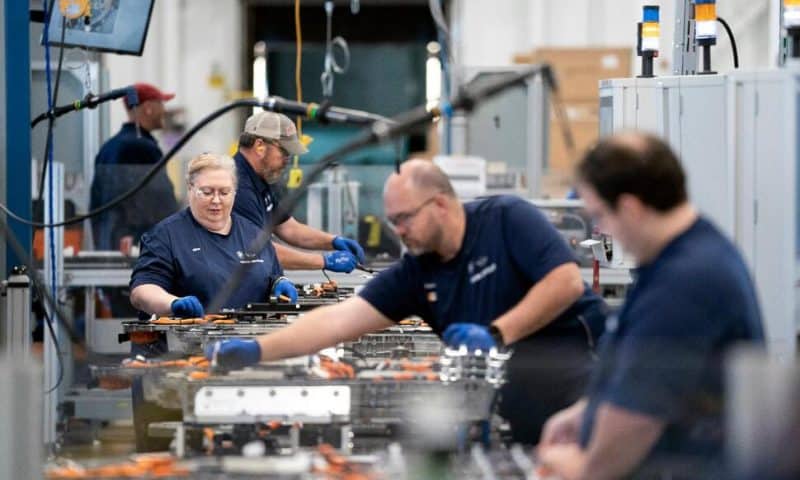BMW will invest $1 billion in its sprawling factory near Spartanburg, South Carolina, to start producing electric vehicles and an additional $700 million to build a electric-battery plant nearby.
GREER, S.C. — BMW will invest $1 billion in its sprawling factory near Spartanburg, South Carolina, to start producing electric vehicles and an additional $700 million to build a electric-battery plant nearby.
The German automaker’s announcement Wednesday reflects its commitment to transitioning to electric-vehicle production in North America, in line with similarly ambitious plans by other major automakers.
The investment in the 7-million-square-foot vehicle factory in Greer, in the foothills of the Blue Ridge Mountains, would add an unspecified number of jobs to the more than 11,000 workers there.
The battery plant, to be built in nearby Woodruff, will employ 300, the company said, with hiring to begin within a few years.
In addition, BMW said it has signed a deal with Envision AESC of Japan to supply battery cells for a new class of at least six electric SUVs that will be built at the plant in Greer by 2030.
Envision will build its new factory at an unspecified site in South Carolina. The companies wouldn’t say how many people will be hired. But the number of jobs could be significant: Battery cell plants being built by other companies will employ between 1,100 and 2,200 workers.
Cells from the Envision factory will be shipped to the 1-million-square-foot plant in Woodruff, where they will be assembled into battery packs for the electric SUVs built at the larger plant. Assembling cells into packs takes far less labor than manufacturing the cells.
The company said the new cells will contain a battery chemistry that increases the amount of energy they can store.
Envision has a U.S. factory in Smyrna, Tennessee, near a Nissan assembly plant, and it is building a plant in Kentucky.
The BMW plant already builds lithium-ion battery modules for two plug-in gas-electric hybrid SUVs that are constructed at the site. The plant in Greer, which opened 30 years ago, now builds 11 SUV models. BMW says the plant has made the company the largest automotive exporter in the U.S. based on vehicle value.
“We are anticipating the growing demand for electric vehicles not only in the United States but around the world,” Oliver Zipse, the company chairman, said Wednesday at the Greer plant.
BMW declined to say when the first new EV might be produced. But Zipse said the company wants to increase EV production at the plant by 10% every two years, with the goal of having EVs amount to half its total auto production by 2030.
But BMW will keep making gas-powered vehicles at the Greer plant, Zipse said: “We offer choice, not limitations.”
Since breaking ground on the plant in 1992, the company has invested $12 billion in South Carolina. It’s the German automaker’s largest factory, Zipse noted.
BMW’s announcement follows several waves of battery and electric vehicle assembly plant announcements in North America as automakers try to establish a domestic supply chain for the next generation of vehicle propulsion.
Other automakers have outlined their own ambitious goals for electric vehicle production, with General Motors saying it expects to make only electric passenger vehicles by 2035. Ford wants half of its global production to be electric vehicles by 2030.
Ford, GM, Hyundai-Kia and VinFast have all said they will build electric vehicle assembly plants in the United States or to retool older plants to manufacture EVs. And Tesla expects to build another plant in North America.
In addition, Honda, Ford, GM, Toyota, Hyundai-Kia, Stellantis and VinFast of Vietnam have announced plans for a total of 11 U.S. battery plants.
A new U.S. law, the Inflation Reduction Act, gives them even more incentive to build batteries in North America. It includes manufacturing tax credits, and a tax credit of up to $7,500 that could be used to defray the cost of buying an electric vehicle. But to qualify for the full credit, the electric vehicle must contain a battery built in North America, with 40% of the metals mined or recycled on the continent.
Electric vehicle sales are expected to rise dramatically between now and 2030 in the U.S. and globally. But even at the start of the next decade, they will amount to just over one-third of U.S. new vehicle sales.
The LMC Automotive consulting firm expects EVs to represent 5.6% of U.S. sales this year, rising to 13.5% by 2025 and 36.4% in 2030.

